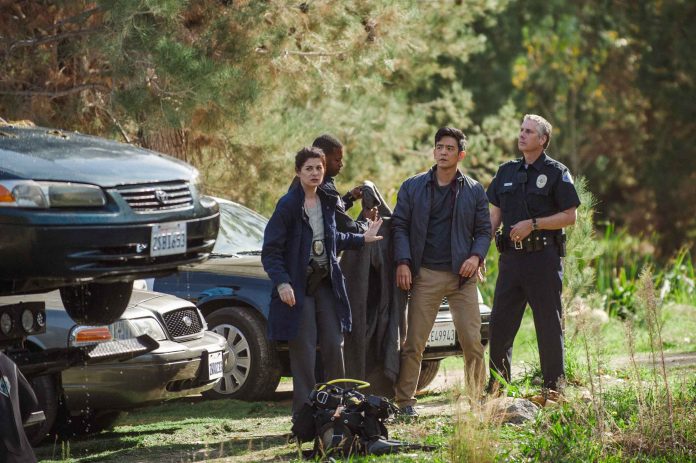Hollywood Presents: Searching After David Kim (John Cho)’s 16-year-old daughter goes missing, a local investigation is opened and a detective is assigned to the case. But 37 hours later and without a single lead, David decides to search the one place no one has looked yet, where all secrets are kept today: his daughter’s laptop. In a hyper-modern thriller told via the technology devices we use every day to communicate, David must trace his daughter’s digital footprints before she disappears forever. SEARCHING stars John Cho (Star Trek, Harold & Kumar), Debra Messing (“Will & Grace”), Joseph Lee and Michelle La. SEARCHING is directed by Aneesh Chaganty and produced by Timur Bekmambetov, Sev Ohanian, Adam Sidman and Natalie Qasabian. The film is written by Aneesh Chaganty & Sev Ohanian, while being executive produced by Maria Zatulovskaya, Ana Liza Muravina, Igor Tsay and co-produced by Congyu E. Juan Sebastian Baron is the Director of Photography. SEARCHING is edited by Will Merrick & Nick Johnson. Music is by Torin Borrowdale and sound design is by Nathan Ruyle. The Production Designer is Angel Herrera and casting is by Lindsey Weissmueller. SEARCHING is a Screen Gems and Stage 6 Films presentation in association with Bazelevs, a Timur Bekmambetov production. The film has a running time of 1 hour and 42 minutes. This film has been rated PG-13 by the MPAA for the following reasons: Thematic content, some drug and sexual references, and for language. ****
“The biggest challenge for any producer is just to find the right filmmaker,” says Timur Bekmambetov. “Then you just shake hands. I know that because I am a director myself, and it’s very important that when a producer makes a decision about a filmmaker, you have to let them make their own movie and especially with one like this, it was more important for me to be there for them in the edit. We at Bazelevs are looking for talented filmmakers that we can help AND learn from.” Indeed, as much as SEARCHING is shaped the way it reimagines modern technology and digital storytelling, it is, importantly, anchored by a riveting, dramatic mystery with unpredictable twists and a compelling emotional base. “We wanted to make a movie that we wanted to watch,” explains Chaganty. “Our favorite kinds of movies are gripping and emotional with a lot of suspense and intrigue, and from day one, we wanted this to be a story where you would just fall into the mystery and almost forget the way it’s being told.” In developing the screenplay, Chaganty and Ohanian watched dozens of missing person thrillers to see what worked and what didn’t, and various strategies filmmakers had employed in order to conceal information and subtly misdirect. “If you look at the actual storyline of SEARCHING,” says Chaganty, “you’ll see a lot of the traditional elements of the mystery thriller. Our goal was to mirror those things that we loved best and adapt that into the screen-life concept.” John Cho, drawn to the emotional arc of the characters, David Kim’s in particular, as well as the twists and turn of the plot, was also fascinated and challenged by the screen-life approach in telling the story. Though initially skeptical, he ultimately warmed to the acting challenge presented by the new format.
“I was surprised that one could tell this story, so large in scope and drama, through this paradigm. I wasn’t sure how we would be able to convey all this emotion in this way and stay honest but I was pleasantly surprised. It’s challenging for sure, the lens is very close to you so there is no way you can be fake. So, in that way, it is very truthful. It’s typically one angle per scene and it’s all told from David’s POV so it’s tough in the sense that there are no escapes, you have to be incredibly focused and present because you can’t count on coverage to cover up your mistakes. It was a very exacting and emotionally intense experience,” Cho says. Michelle La who plays Margot, David Kim’s missing daughter, related to her character.
“Margot is a bright, 16-year old person with a lot of life inside her. She grew up in a loving family but throughout the movie, we discover she’s had a difficult time expressing herself and finding her way through a tragic time in her life. I definitely understood some of what she went through. Being 16 is not easy. People sometimes write teenagers off as ‘misunderstood’ when it can be much deeper than that and trying to navigate all those emotions can be overwhelming,” she says. All the actors enjoyed a very interactive relationship with cinematographer Juan Sebastian Baron. During the shoot, Baron juggled the technical and creative aspects of more than a dozen recording devices used to film SEARCHING, each which revealed its own rules and constraints. And he found himself less occupied with lens choice or dolly movement, since most of the “cameras” recording the action were fixed, whether attached to a computer or mimicking surveillance optics. Baron, who met Chaganty in film school, relished the opportunity to break new cinematic ground with SEARCHING but was also grateful some of that had been done before him. “Luckily, Bazelevs, our production company, had developed a lot of technology in-house that helped us accomplish this, like some of those FaceTime conversations and stuff.
They had engineered this rig with dummy laptops with GoPros attached to them and LED lights to kind of mimic the screen, and they all go into this security camera switcher system – it’s this very Frankenstein contraption, but it really was the best way to solve the problem of doing scenes where the actors are talking to each other via FaceTime. And it also gave Aneesh the opportunity to watch playback and kind of have a more traditional director relationship with his actors,” he says. Authenticity was the overarching goal and as Baron points out, technical approach and performance intersected as everyone tried to discern a way to achieve that. Ultimately, John Cho became a de facto member of the live action camera crew. “The prep process for this movie was a lot of not only technical conversations, but we also had a lot of philosophical conversations, of ‘how are we going to do this? What is our approach? What does this mean? Are we going to have the actors operate the camera, is that part of our philosophy for this? Are we going to do a lot of the deterioration of the footage in post, or are we going to capture it as real as possible? Aneesh’s mandate from Day One really was, ‘I want to make this as real as possible. I want people to feel connected to this movie because it’s really relatable and very honest.’ In keeping with that, the cinematography has to be grounded. It has to be just as organic. And a lot of that rested on John Cho. We knew that if we wanted this movie to feel like John Cho’s point of view, there was no substitute to him holding the phone, among other things. And that’s intimidating, to be acting and also serving as a kind of camera operator. And seeing yourself as you are acting. After a few takes, everybody really embraced it, and everybody went along with how different it was. And I think it takes a lot of courage for an actor to jump into that,” Baron says.
The Bazelevs team and producer Natalie Qasabian proved to be vital creative partners in the execution of these complex series of assignments and production challenges for a “live action” film assembled like an animated one. “The entire process of editing was over a year. We had two editors working full time, and even though we were working in the modern age of digital, non-linear editing, the level of detail we had to bring to each scene felt like we were cutting on an old Moviola,” says Ohanian. “The rendering was so complex – we’d ask the editors to make a change, and they’d say, ‘come back in a couple of hours’ when we are so used to seeing things instantly, because of the sheer size of the files and programs we were working with.” While the process was painstaking and pioneering, the result is a movie that resonates with the familiar iconography and discourse of contemporary life.
“Ever since I picked up a camera I’ve always liked films that told stories we know in a way that we don’t expect. SEARCHING takes that to a whole new level. But when we were filming, I wasn’t thinking about the novelty of the approach. When you’re in it, you’re not thinking you might be doing something groundbreaking, you’re just doing the best work you can, trying to be true to the characters and story. But every once in a while, during this process, I 14 would take a step back and think ‘what we are making could be really, really cool,’” sums up Chaganty.

